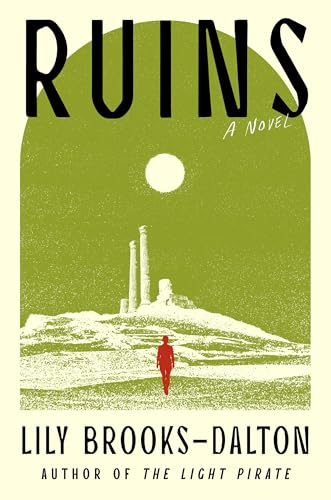The Caretaker by Marcus Kliewer
Publication: April 21st, 2026
Atria
Hardcover. 320 pages.
Pre-order: Bookshop.org | Amazon
From Goodreads:
"Follow the Rites...
Nothing less than the survival of humanity is at stake.
From Marcus Kliewer, a new “titan of the macabre and unsettling” (Erin A. Craig, #1 New York Times bestselling author), comes a supernatural horror about a young woman who accepts a caretaking job from Craigslist, only to discover the position has consequences far greater—and more dangerous—than she ever could have imagined.
EXCITING OPPORTUNITY:
Caretaker urgently needed. Three days of work. Competitive pay. Serious applicants ONLY.
Macy Mullins can’t say why the job posting grabbed her attention—it had the pull of a fisherman’s lure, barbed hook and all—vaguely ominous. But after an endless string of failed job interviews, she's not exactly in the position to be picky. She has rent to pay, groceries to buy, and a younger sister to provide for.
Besides, it’s only three days’ work…
Three days, cooped up in a stranger’s house, surrounded by Oregon Coast wilderness.
What starts as a peculiar side gig soon becomes a waking nightmare. An incomprehensible evil may dwell on this property—and Macy Mullins might just be the only thing standing between it, and the rest of humanity.
Follow the Rites...
Follow the Rites...
Follow the Rites...
..--- / ..... / ---.."
I loved We Used to Live Here and I am so excited for something new from Marcus Kliewer! I have an ARC of this one that I've been holding onto and I'm finally hoping to start it soon.
In a self-running, smart house, a young and sentient Roomba listens as her owner, Harold, reads aloud to his dying wife, Edie. Mesmerized by To Kill a Mockingbird and craving the human connection she witnesses in Harold’s stories, the little vacuum renames herself Scout and embarks on a journey of self-discovery.
But when Edie passes away, Scout and her fellow sentient appliances discover that there are sinister forces in their midst. The omnipresent Grid, which monitors every household in the City, seeks to remove Harold from his home, a place he’s lived in for fifty years.
With the help of Adrian, a neighborhood boy who grows close to Scout and Harold, as well as Kate, Harold and Edie’s formerly estranged daughter, the humans and the appliances must come together to outwit the all-controlling Grid lest they risk losing everything they hold dear."
As an enormous The Brave Little Toaster fan, I am ecstatic about the premise of this book. I was fortunate enough to receive an ARC of this one a while ago that I've been saving and it's finally just about time to dive in!
Stealing America: The Hidden Story of Indigenous Slavery in U.S. History by Linford D. Fisher
Publication: April 28th, 2026
Liveright
Hardcover. 560 pages.
Pre-order: Bookshop.org | Amazon
From Goodreads:
"'An indispensable book, as intellectually provocative as it is emotionally wrenching.' ―Greg Grandin¸ author of the Pulitzer Prize–winning The End of the Myth
Although the first enslaved Africans arrived in Jamestown in 1619, European slavery in America began more than a century before. In a work distinguished not only by its original research but by its “passionate prose” (James F. Brooks), historian Linford Fisher demonstrates how the enslavement of Indigenous people began in the years just after 1492, ensnaring an estimated three to six million Natives throughout the Americas. Although largely erased from the public consciousness, Native enslavement continued for centuries to become a colossal phenomenon that affected nearly 600,000 Native?Americans in North?America?alone, revealing the shocking truth that American colonizers enslaved Natives in roughly the same numbers as they imported enslaved Africans.
From Virginia to California, from New England to Barbados, Stealing America traces the history of Indigenous enslavement and land dispossession, detailing how colonizers captured Natives and often deliberately mislabeled them as Black slaves to avoid detection. While the American Revolution pealed the bells of freedom for colonists, it paved a larcenous trail of westward expansion that subsequently plundered Indigenous land and stole the labor of Natives from nations like the Cherokee, Navajo, Nisean, and many others. “This double theft,” Fisher writes, “was central to the origins, growth, and eventual success of the English colonies and the United States―not just initially but throughout all of American history.”
In this expansive narrative, Fisher weaves together accounts of major episodes in American history including early colonization, the American Revolution, and the Civil War with lesser-known stories of Native enslavement and land loss. Fisher upends conventional histories about the nature of American slavery, revealing enslaved Natives in places we have overlooked, including southern antebellum plantations and the nineteenth-century American West. After Congress outlawed Native slavery in 1867, Americans forced Indigenous children into boarding schools and white homes, where they labored under forced assimilation. This practice was not reformed until the latter twentieth century, when Native nations finally secured increasing rights and self-determination.
Nearly fifteen years in the making, this magisterial volume not only uncovers a five-century genocidal history but also illuminates the myriad ways Native Americans have fought for their sovereignty and maintained community. The most comprehensive work of its kind, Stealing America emerges as a saga of both persistent colonialism and Indigenous resilience, one that reframes American history at its core."



















































